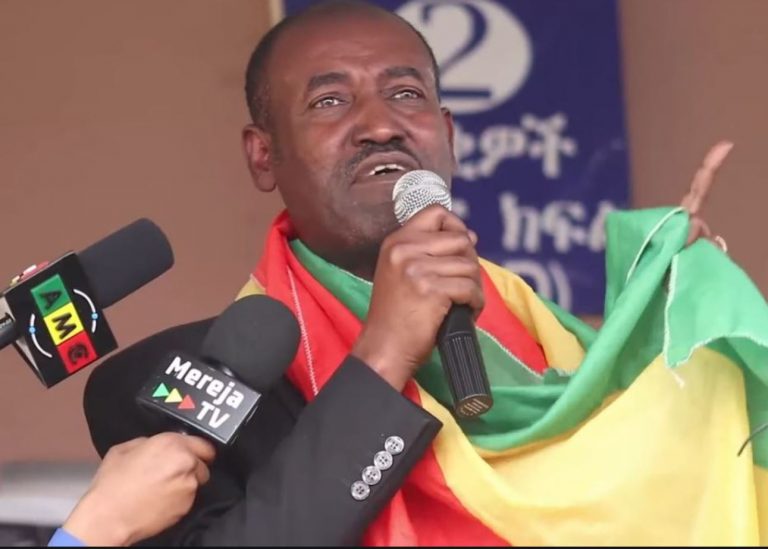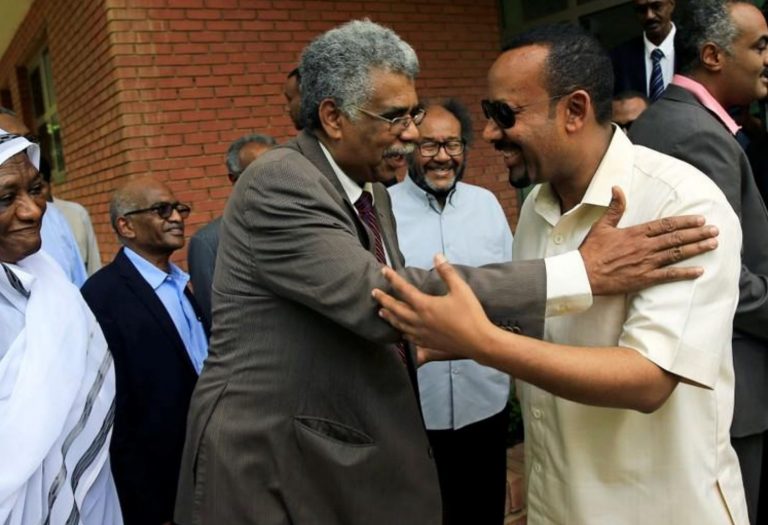Corruption in the Ethiopian JUST US Sector
For the past several months, I have been commenting on the findings of the World Bank’s “Diagnosing Corruption in Ethiopia”, a 448-page report covering eight sectors (health, education, rural water supply, justice, construction, land, telecommunications and mining). In this my sixth commentary, I focus on “corruption in the justice sector”. The other five commentaries are available at my blog site.
 Talking about corruption in the Ethiopian “justice sector” is like talking about truth in Orwell’s 1984 Ministry of Truth (“Minitrue”). The purpose of Minitrue is to create and maintain the illusion that the Party is absolute, all knowing, all-powerful and infallible. The purpose of the Ministry of Justice in Ethiopia is to create the illusion that the ruling regime under the command and control of the Tigrean People’s Liberation Front (TPLF) masquerading as the Ethiopian People’s Democratic Front (EPDRF) is absolute, all knowing, all-powerful and infallible.
Talking about corruption in the Ethiopian “justice sector” is like talking about truth in Orwell’s 1984 Ministry of Truth (“Minitrue”). The purpose of Minitrue is to create and maintain the illusion that the Party is absolute, all knowing, all-powerful and infallible. The purpose of the Ministry of Justice in Ethiopia is to create the illusion that the ruling regime under the command and control of the Tigrean People’s Liberation Front (TPLF) masquerading as the Ethiopian People’s Democratic Front (EPDRF) is absolute, all knowing, all-powerful and infallible.
I have long caricatured the “justice sector” of the TPLF/EPDRF as a kangaroo justice system founded on a sham, corrupt and whimsical legal process. What passes off as a “justice system” in Ethiopia is little more than a marketplace where “justice” is bought and sold in a monopoly controlled by one man supported by a few nameless, faceless and clueless men who skulk in the shadows of power. It is a justice system in which universal principles of law and justice are disregarded, subverted, perverted and mocked. It is a system where the poor, the marginalized, the audacious journalists, dissidents, opposition and civic society leaders are legally lynched despite the criticism and bootless cries of the international community. It is a system in which regime leaders, their families, friends and cronies are above the law and spell justice “JUST US”.
My first critique of the TPLF/EPDRF “justice system” appeared in 2006 when I wrote a 32-page analysis titled, “Keystone Cops, Prosecutors and Judges in a Police State.” It was written in the first year of what has become my long day’s journey into the dark night of advocacy against human rights violations in Ethiopia and Africa. The piece was intended to be a critical analysis of the trial of the so-called Kality defendants consisting of some 130 or so major opposition leaders, human rights advocates, civic society activists, journalists and others in the aftermath of the 2005 election. I tried to demonstrate that the show trial of those defendants was little more than a third-rate theatrical production staged to dupe the international community. I also tried to show how a dysfunctional and bankrupt judicial system was used to destroy political opposition and dissent. I described the “judicial proceedings” of the Kality defendants as “an elaborate hoax, a make-believe tribunal complete with hand-picked judges, trumped up charges, witless prosecutors, no procedures and predetermined outcomes set up to produce only one thing: a monumental miscarriage of justice.”
A glossy “diagnosis” of corruption in the Ethiopian justice sector
The WB’s “diagnosis” of corruption in “Ethiopia’s justice sector” is based on “interviews of 60 individuals” including “federal judges and prosecutors”, police, private attorneys, etc. in the capital and at another location. No ordinary citizens were included in the interview panel or the smaller focus groups. The study is intended to “explore the incidence of corruption in Ethiopia’s justice sector (including not only the courts but also several other organizations).” The “justice sector” includes, among others, “courts, police, prosecutors, administrative agencies with quasi-judicial powers, and public and private attorneys, prisons, and those in the executive and legislative branches responsible for enacting the laws and regulations governing their operations”.
The report begins with unusual disclaimers and apologia. The author proclaims that “this report begins from an agnostic standpoint—attempting only to document reality in Ethiopia’s justice sector and to compare it… with the situation elsewhere in African and other countries…” It is not clear what she means by “an agnostic standpoint”, but her analysis is frontloaded with servilely apologetic language manifestly intended not to offend or appear to point an accusatory finger at the ruling regime in Ethiopia. The report appears to have been written with some trepidation; perhaps the author was afraid of a backlash (tongue-lash) from the regime. The author timorously tiptoes around well-established and notorious facts about corruption in the regime’s justice sector. In light of the many disclaimers, reservations and contingencies in the report, it is obvious that the author does not want to call a spade a spade, so she calls the spade a bucket. But corruption by any disclaimer is still corruption; and Ethiopia’s justice sectors reeks of corruption.
The author claims an examination of “corruption in the justice sector is important because it undermines the peaceful resolution of conflicts, the control of corruption in other sectors, the strengthening of the normative framework underlying private and public actions (the rule of law), and the creation of a predictable environment for public and private transactions.” According to the study, corruption in the Ethiopian justice sector “takes one of two forms: (a) political interference with the independent actions of courts or other sector agencies, or (b) payment or solicitation of bribes or other considerations to alter a decision or action.” The study claims the “most common form of corruption involves bribes solicited by or offered to police to ignore a criminal offense, not make an arrest, or not bring witnesses or suspects to court (which can cause a provisional adjournment of the case). Traffic police are the worst offenders.” Another “common form of corruption” involves “payment of court staff to misplace case files or evidence” (a practice that has nearly disappeared because of new judicial policies on archive management introduced under a Canadian International Development Agency program”.
The author provides a catalogue of corrupt practices which she claims are disputed by various respondents in her study but include “(a) sales of judgments or other judicial actions in civil disputes; (b) lawyers’ solicitation of “bribes” that never reached the bench; (c) prosecutors’ misuse of their own powers, in response to bribes or political directives, to advance or paralyze a case; and (d) the corrupt actions of various officials entrusted with enforcement of judgments, especially in civil cases.” She attributes the divergence in viewpoints to a “likely gap between perceptions and reality [which] are partly a function of the persistent lack of transparency in personnel policies.”
What is remarkable about the WB “justice sector” study is the fact that the author, by focusing on the “most common form of corruption” (i.e. petty police, particularly traffic police, corruption), fails to critically probe grand corruption involving party officials and regime leaders and their cronies who routinely subvert the justice system through political interference and pressure to protect their political and economic interests. She circumvents serious inquiry into grand corruption in the “justice sector” by providing catalogues of “potential forms of criminal and civil corruption” and “corruption risks”. She appears averse to investigating high-level corruption that occurs in the process of judicial appointment of handpicked party loyalists and hacks, laws written to aid certain elites in society, or in the debasement and corruption of the integrity and independence of the judiciary. She ignores the type of justice corruption that occurs in “state capture” where economic elites develop cozy relationships with political and judicial officials through whom they obtain favorable judicial decisions to advance their own advantage. For instance, on the issue of political interference in the judicial process, the author demonstrates her “agnosticism” by reporting that “the one who came closest eventually admitted that ‘there was some [political interference], but it was very rare.’” Other responses ranged from ‘a moderate amount’ (limited to the bad apples) to the extreme of holding that ‘every civil judgment is sold.’”
Curiously, the author points an accusatory finger at petty corruption as the “most common form of corruption” distracting attention from the systemic and structural corruption in the justice sector. The importance of petty corruption must not be understated because of the serious impact it has on the lives and livelihoods of ordinary citizens interacting with police, prosecutorial and other petty judicial officials. There is ample anecdotal evidence of petty corruption in which ordinary Ethiopian citizens and businesspersons are “shaken down” by traffic cops or minor functionaries in the judicial or state bureaucracy seeking small bribes. However, though petty corruption may be easier to detect, the real focus should be on grand corruption which is systemic, structural and difficult to detect and nearly impossible to punish. Structural and systemic corruption in the legal institutions, rules, and norms and those who are practitioners in the system create, maintain and sustain a culture of corruption in the justice sector, which the author appears to overlook.
Justice corruption is primarily a systemic failure of judicial institutions, lack of political will and capacity to manage judicial resources, maintain integrity of institutions. The author makes abstract references to the usual catalogue of corruption variables but does not seek to gather data to illuminate the scope, breadth and gravity of the problem of political interference and lack of accountability in the justice system. Grand corruption in the justice sector stems from the fact that political officials have wide authority over judicial officials (from appointment to management of judicial functions); and political officials have little accountability and incentive to maintain the integrity of the justice sector. There are few functional formal systems of control in the relationship between the judicial and political processes in Ethiopia. If there ever were control systems, they have been broken for a long time making it nearly impossible to administer fairly the laws while maintaining accountability in the form of a robust reporting system and transparency in the form of robust management practices. Such institutional decay has promoted the growth of a culture of corruption in the justice sector and continues to undermine not only the broad adjudicatory role of justice sector institutions but also public confidence in the integrity of the justice system itself.
Justice sector in a police state?
Justice in a dictatorship is to justice as military music is to music. No reasonable person would consider martial law (military rule) to produce justice. By definition dictatorship — a form of government in which absolute power is concentrated in the hands of a dictator or a small clique — is the quintessential definition of injustice. Any form of government that operates in flagrant disregard of the rule of law is inherently corrupt.
I have on previous occasions tried to expose such corruption in Ethiopia’s “justice sector” with anecdotal evidence of arbitrary administration of justice or denial of fair trial to those accused of “terrorism”, “treason” and even “corruption”, opposition leaders, human rights advocates, journalists, etc. In the kinder and gentler police state that Ethiopia has become, any petty “law enforcement” official of the regime has the power to arrest and jail an innocent citizen. As I argued in my February 2012 commentary, “The Prototype African Police State”, a local police chief in Addis Ababa felt so arrogantly secure in his arbitrary powers that he threatened to arrest a Voice of America reporter stationed in Washington, D.C. simply because that reporter asked him for his full name during a telephone interview. “I don’t care if you live in Washington or in Heaven. I don’t give a damn! But I will arrest you and take you. You should know that!!”, barked the impudent police chief Zemedkun. If a flaky policeman can exercise such absolute power, is it unreasonable to imagine those at the apex of power have the power to do anything they want with impunity. The regime in Ethiopia is the petri dish of corruption and living proof that power corrupts and an absolute power corrupts absolutely.
In my view, denial of due process (fair trial) is the highest form of corruption imaginable in the “justice sector” because it results in the arbitrary deprivation of a person’s life, liberty and property. Could anyone (other than those politically connected) really expect to get a fair trial in the regime’s kangaroo courts or fair treatment in the pre-trial process?
The systemic corruption in the “justice sector” is that the law of the land is ignored, disregarded and perverted at the whim and fancy of those in power. For instance, the presumption of innocence (Eth. Const. Art. 20(3)) is openly flouted. The late leader of the regime used to routinely and publicly talk about the guilt of opposition leaders, journalists and others standing trial without so much of an awareness of the suspects’ right to a presumption of innocence or appreciation of the risk of prejudicial pretrial publicity emanating from such inflammatory statements which are prohibited under the Constitution and other international human rights regimes (e.g. Article 11 of the Universal Declaration of Human Rights, Article 14(2) of the International Covenant on Civil and Political Rights (ICCPR) and Article 7(b) of the African Charter on Human and People’s Rights (ACHPR)). In 2011, the late leader of the regime proclaimed the guilt of freelance Swedish journalists Johan Persson and Martin Schibbye on charges of “terrorism” while they were being tried and he was visiting Norway. He emphatically declared the duo “are, at the very least, messenger boys of a terrorist organization. They are not journalists.” Persson and Schibbye were “convicted” and sentenced to long prison terms.
Show trials by publicity and demonization are another hallmark of the regime’s justice system. Following the 2005 election, the late leader of the regime publicly declared that “The CUD (Kinijit) opposition leaders are engaged in insurrection — that is an act of treason under Ethiopian law. They will be charged and they will appear in court.” They were charged, appeared in “court” and were convicted. In December 2008, the late leader railroaded Birtukan Midekssa, the first female political party leader in Ethiopian history, without so much as a hearing let alone a trial. He sent her straight from the street into solitary confinement and later declared: “There will never be an agreement with anybody to release Birtukan. Ever. Full stop. That’s a dead issue.” In making this statement, the late leader proclaimed to the world that he is the law and the ultimate source of justice in Ethiopia. His words trump the country’s Constitution!
In 2009, one of the top leaders of the regime labeled 40 defendants awaiting trial as “desperadoes” who planned to “assassinate high ranking government officials and destroying telecommunication services and electricity utilities and create conducive conditions for large scale chaos and havoc.” They were all “convicted” and given long prison sentences.
Violations of the constitutional rights of those accused of crimes by the regime are rampant. Article 20 (2) provides, “Any person in custody or a convicted prisoner shall have the right to communicate with and be visited by spouse(s), close relatives and friends, medical attendants, religious and legal counselors.” Internationally celebrated Ethiopian journalists including Reeyot Alemu, Woubshet Taye and many others were denied access to legal counsel for months. Ethiopian Muslim activists who demanded an end to religious interference were jailed on “terrorism” charges were also denied access to counsel. They were mistreated and abused in pretrial detention. Scores of journalists, opposition members and activists arrested and prosecuted (persecuted) under the so-called anti-terrorism proclamation were also denied counsel and speedy trials and have languished in prison for long periods. Suspects are interrogated without the presence of counsel and coerced confessions extracted. Yet, Article 19 (5) provides, “Everyone shall have the right not to be forced to make any confessions or admissions of any evidence that may be brought against him during the trial.”
Article 19 (1) provides, “Anyone arrested on criminal charges shall have the right to be informed promptly and in detail… the nature and cause of the charge against him… Article 20 (2) provides, “Everyone charged with an offence shall be adequately informed in writing of the charges brought against him. Recently, the regime arrested members of its officialdom and their cronies on suspicion of corruption and kept the suspects in detention for months without informing them “promptly and in detail the charges against them”. Although the regime’s “top anti-corruption official” claimed that the corruption “suspects have been under surveillance for two years”, on their first court appearance, the prosecutors requested a 14-day continuance to gather more evidence! There is no judicial system in the world where suspects are arrested of committing crimes after being investigated for 2 years and then the prosecution asks for endless continuances to gather additional evidence.
Injustice impersonating justice
The 2012 U.S. State Department Human Rights report concluded, “The law provides for an independent judiciary. Although the civil courts operated with a large degree of independence, the criminal courts remained weak, overburdened, and subject to political influence.” The WB could have done a much better job of “diagnosing corruption” in Ethiopia’s “justice sector”. Candidly speaking, any deficiency in the report should not reflect exclusively on the World Bank or its consultants but on Ethiopians, particularly the Ethiopian intelligentsia, who do not seem find it worth their time or effort to read, challenge and supplement such reports. It seems few, very few, Ethiopian scholars and analysts take the time and effort to locate, study and critically analyze such important studies done by international institutions and other private research institutions.
I doubt the WB justice sector study will be of much value to policy makers, scholars or the casual reader. Having said that, the burden is on Ethiopian scholars in Ethiopia and abroad to work collaboratively and carefully document corruption in Ethiopia’s justice and other sectors. No study of Ethiopia’s justice sector is worthy of the title if it does not rigorously evaluate the factors that are at the core of corruption in the “justice sector” – absence of the rule of law, lack of independence of the judiciary, absence of due process, lack of impartiality and neutrality in the judicial process, the culture of corruption and impunity and the lack of accountability, transparency and confidence in the legal system. Such a study is the principal responsibility of Ethiopians, not the World Bank or its consultants. On the other hand, when the sword of justice is beaten into a sledgehammer of injustice, it is the supreme duty of ordinary citizens to expose it!
Professor Alemayehu G. Mariam teaches political science at California State University, San Bernardino and is a practicing defense lawyer.
Previous commentaries by the author are available at:
http://open.salon.com/blog/almariam/
www.huffingtonpost.com/alemayehu-g-mariam/
Amharic translations of recent commentaries by the author may be found at:
http://www.ecadforum.com/Amharic/archives/category/al-mariam-amharic
http://ethioforum.org/?cat=24





